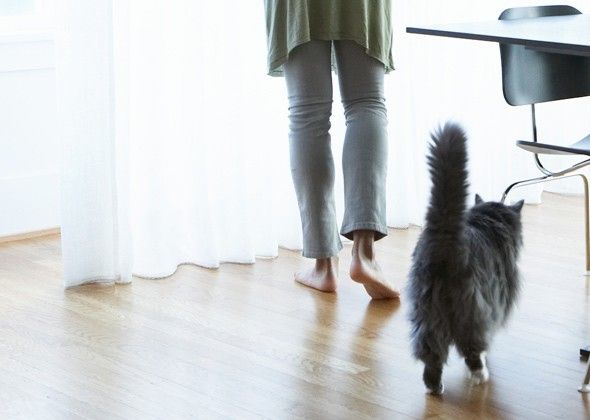
Signs of Common Health Problems in Senior Cats

While once cats were considered “senior” at the age of eight, due to many changes in how cats live, it’s no longer unusual for a cat to live well into her teens. However, cats still reach their senior years around the age of 7. While this seems very young for a cat that might have more than half of their life left to live, it is important to realize the changes in their biology. Even if you do not see any physical changes, it is still important to think of your cat in her proper part of her life cycle.
Typically, as a cat begins to enter their senior years they begin to show signs of slowing down. They may be less active or less inclined to jump or climb. While some of these changes could simply be caused by your aging kitty having less energy than she once did, they shouldn’t be ignored. Any such symptoms could be signs of a serious health issue and should be discussed with your veterinarian. Here are some signs that your cat might be experiencing one of these common senior cat problems:
1) Arthritis
As your cat ages past twelve years old, watch for signs of arthritis. If he or she is experiencing difficulty going up or down the stairs, jumping up onto or off of furniture, grooming its fur, or even urinating outside of the litterbox because of the discomfort of getting into a litterbox, your feline friend may be developing arthritis.
Studies have shown that 90 percent of cats over 12 years of age are likely to have radiographic signs of arthritis, so arthritis is actually quite common in older cats. Should you see any of these signs, bring your cat in to see your veterinarian and we can help you decide what to do to help relieve your cat’s pain.
2) Cancer
Approximately thirty percent of all cats over the age of ten years old may be diagnosed with some type of cancer. If you notice any
of the following symptoms, take your cat to the vet immediately:
- Appetite loss
- Unintential weight loss
- Difficulty eating or swallowing
- Lumps or bumps increasing in size
- Sores that won’t heal
- Bleeding or discharge from the mouth, nose, anus
- Unusual body odor
- Decreased energy
- Difficulty breathing
- Difficulty using the litter box.
One of the most common forms of feline cancer is lymphosarcoma, or lymphoma, although dogs such as Boxers, Golden Retrievers, and
Basset Hounds are prone to developing this disease as well. Some of the symptoms associated with lymphosarcoma include enlarged
lymph nodes, loss of appetite, weight loss, lethargy, coughing, difficulty breathing, vomiting and diarrhea. Please take your senior
cat in immediately if you see any of these symptoms.
3) Dental Disease
If you notice your feline friend having difficulties chewing, or just picking up his or her food and dropping it right away, it may
be a sign of dental disease developing. Periodontal disease is a common health problem in senior cats, especially when your cat
has not had its teeth brushed regularly and years of plaque and tartar are allowed to build up. Schedule regular dental cleanings with
your vet, and be sure to maintain your cat’s dental health on a regular basis to prevent your cat from developing dental diseases.
4) Vision Problems
Cataracts, glaucoma and retinal detachment are common visual issues that senior cats can develop. Periodically check your cat for any
signs of cloudiness of the lens, or even dilated pupils. Also pay attention if your cat seems to be bumping into things while walking.
Should you suspect that your cat needs his or her eyes checked, please take them into the vet and we can provide recommendations or medications to help your feline friend.
5) Hearing Loss
Yes, even cats can lose their hearing over time. If you notice your cat can’t hear as well as he used to, you can teach him hand
signals, stomp your foot to create vibrations or use other forms of visual signals to communicate with your cat.
6) Hyperthyroidism
Hyperthyroidism can be identified when your senior cat begins to show signs of excessive hunger and an abnormal increase in energy.
This condition is characterized by the thyroid gland producing too much of the thyroid hormone. In addition, cats with hyperthyroidism
may also develop hypertension. If you notice signs of an excessive appetite in your older feline, be sure to schedule an appointment
with your vet to discuss treatment options.
7) Kidney Disease
To help treat kidney disease, schedule regular geriatric exams for your senior cat so that your vet can detect any bad signs early on. Although kidney failure is not reversible, a therapeutic diet, medication, etc., can help add months and even years to your beloved pet’s life. Be sure to bring your feline friend in often so we can look into the best treatment options and recommendations.
